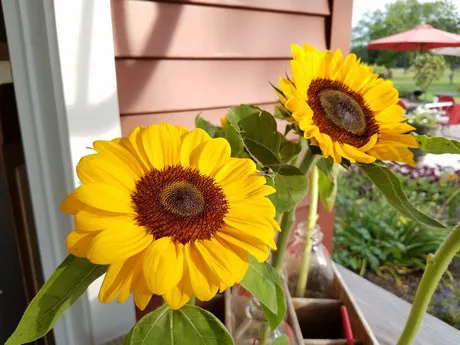The Ultra-Niche Crops project is aimed both at farmers who "do it on the side" and stand-alone cut flower growers. They may be beginning farmers with an interest in being successful on less than 10 acres before expanding, or they may be similar to the farmer in the Virtual Field Trip video (see below) who farms full-time.
The main difference between ultra-niche cut flowers compared to “regular” flower cultivation, Jenny explains, is the target market. "These flowers are meant to be sold directly to consumers, florists or wholesalers that will not be shipping them long distances. The farmer is advised to focus more on targeting retail markets and consumers who desire to buy local products. Focus on growing species that cannot reasonably be cultivated on a large scale and shipped easily, but are still in high demand by the consumer."

Jenny Carleo
Extending the season
Ultra-niche flowers are not in the same league as those grown in large greenhouses - but they do have something in common. Greenhouse cultivation, for instance. "Growers should consider that if they do not want to hire labor or do not have it available, it is advisable to have a greenhouse only as large as they can care for by themselves over the next 5-10 years", Jenny advises small growers who are looking into buying a greenhouse.
While hiring labor for a larger greenhouse can cut into the profit margins, there's no limit to the size of high tunnels, she says. "High-tunnels for season extension should be as large as the grower can afford since they are low-cost to install but can bring a rapid, high return on investment. I have never known a farmer to complain that their high-tunnel is too large, only that they should have bought a bigger one!"
Challenges
Ultra-niche growing comes with its own unique challenges. When growing these exceptionally high-value crops on small parcels it is harder to reap the benefits of economies of scale. "Growers may end up paying retail prices for supplies and fertilizers", Jenny explains. Also, some of these are emerging crops, so there is a big learning curve for everyone, and there may not be crop protection materials or production guides readily available.

Marketing
Another challenge for small-scale flower growers comes in the form of marketing. In mass production, growers sell their produce to wholesale buyers. "They know what they are looking for and they know a high quality product when they see one", Jenny says. Ultra-niche growers, on the other hand, have to market directly to the consumer, which brings along differences in the display at the point of sale. "Consumers are less familiar with the different species and the value of what they are purchasing. The farmer will have to educate the consumers on the product quality, care and value."
On the other hand, large-scale growers can also take a page out of the ultra-niche book. Jenny advises larger growers to keep evolving their crop offerings, and to continue to learn about new opportunities out there. "Change is hard for everyone, but being left behind is worse! Ultra-Niche Crop growers are looking for something special that they can do best. Also, customer relationships are at the heart of success for any farm, a little customer loyalty can go a long way these days."
Supplying to ultra-niche growers
"Ultra-niche happens everywhere", Jenny says. Across the globe, beginning farmers are looking for information on how to be successful in the long-term; information they can find through the USDA-funded Rutgers project, for instance.
They're not just looking for information though. These growers are also in need of products that will help them cultivate their produce, which in turn offers opportunities to breeders, propagators, crop protection producers, etc. If you're one of those, and are looking to get into this growing market, Jenny has some timely advice for you: "Realize that in the next 20 years there are going to be a lot of beginning farmers out there. They may need more advice on choosing the products best suited to them. They also may require more flexibility from the products if they are trying something innovative that hasn’t been done with the product before."
For more information:
njaes.rutgers.edu/ultra-niche-crops/cut-flowers
